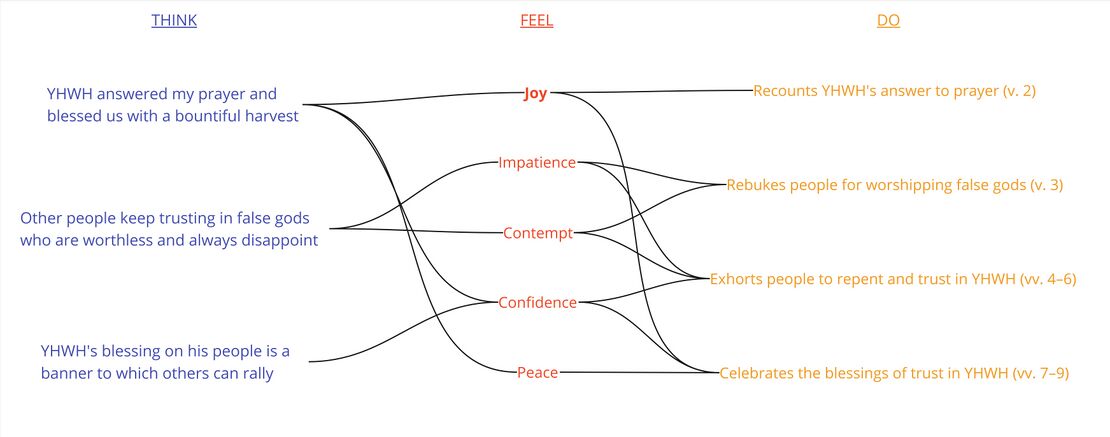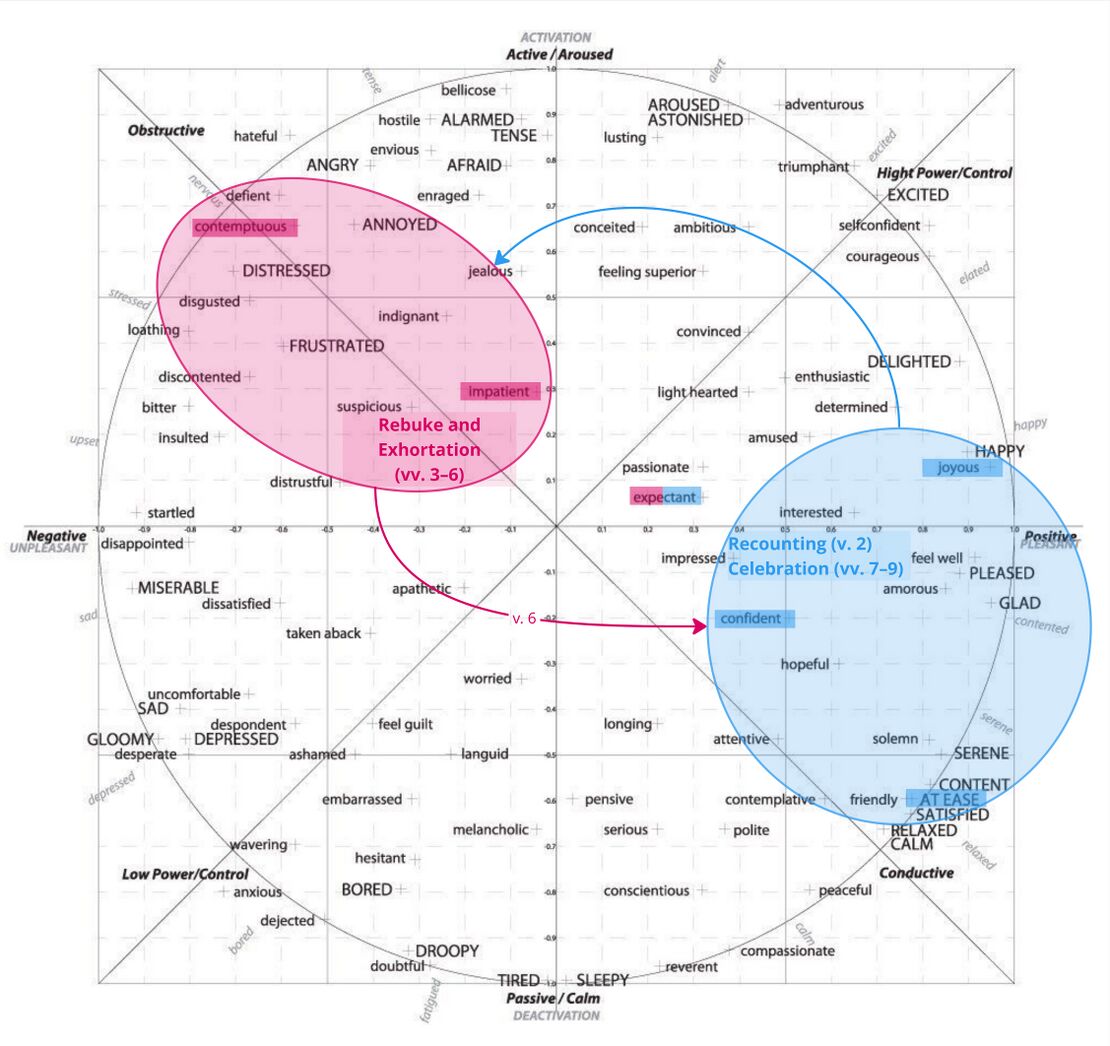Psalm 4 Emotional
From Psalms: Layer by Layer
Psalm 4/Emotional
Choose a PsalmNavigate Psalm 4
Emotional Analysis
This layer explores the emotional dimension of the biblical text and seeks to uncover the clues within the text itself that are part of the communicative intent of its author. The goal of this analysis is to chart the basic emotional tone and/or progression of the psalm.
For a detailed explanation of our method, see the Emotional Analysis Creator Guidelines.
Emotional Analysis Chart
If an emendation or revocalization is preferred, that emendation or revocalization will be marked in the Hebrew text of all the visuals.
| Emendations/Revocalizations legend | |
|---|---|
| *Emended text* | Emended text, text in which the consonants differ from the consonants of the Masoretic text, is indicated by blue asterisks on either side of the emendation. |
| *Revocalized text* | Revocalized text, text in which only the vowels differ from the vowels of the Masoretic text, is indicated by purple asterisks on either side of the revocalization. |
| Verse | Text (Hebrew) | Text (CBC) | The Psalmist Feels | Emotional Analysis Notes |
|---|---|---|---|---|
| 1 | לַמְנַצֵּ֥חַ בִּנְגִינ֗וֹת מִזְמ֥וֹר לְדָוִֽד׃ | For the director. With stringed instruments. A psalm. By David. | ||
| 2 | בְּקָרְאִ֡י *עָנָנִי* ׀ אֱלֹ֘הֵ֤י צִדְקִ֗י | When I called out, the God who makes things right for me answered me. | Joy that YHWH has heard him and made things right for him; Relief at no longer being in distress. |
The "joy" in vv. 7–9 (see emotional note on v. 8) is implicit in v. 2, where the psalmist recounts how YHWH answered his prayer for a bountiful harvest (cf. v. 8). |
| 2a | בַּ֭צָּר הִרְחַ֣בְתָּ לִּ֑י | In the distress, you granted me relief. | ||
| 2b | *חַנַּנִי* | He was merciful to me | ||
| 2c | *וְשָׁמַע* תְּפִלָּתִֽי׃ | and heard my prayer. | ||
| 3 | בְּנֵ֥י אִ֡ישׁ עַד־מֶ֬ה *כִבְדֵי לֵב* | Mortal humans, how long [will you be] heavy-hearted? | Impatience at the stubbornness of people who worship idols Contempt towards those who love vanity. Expectation that those who used to worship idols will offer right sacrifices and trust in YHWH (v. 6) |
See Speech act notes |
| 3a | *לָמָּה* תֶּאֱהָב֣וּן רִ֑יק | Why would you love what is worthless, | ||
| 3b | תְּבַקְשׁ֖וּ כָזָ֣ב סֶֽלָה׃ | seek what is false? Selah. | ||
| 4 | וּדְע֗וּ כִּֽי־הִפְלָ֣ה יְ֭הוָה חָסִ֣יד ל֑וֹ | But know that YHWH has set apart one who is loyal to him. | ||
| 4a | יְהוָ֥ה יִ֝שְׁמַ֗ע בְּקָרְאִ֥י אֵלָֽיו׃ | YHWH hears when I call out to him. | ||
| 5 | רִגְז֗וּ | Tremble | ||
| 5a | וְֽאַל־תֶּ֫חֱטָ֥אוּ | and do not sin! | ||
| 5b | אִמְר֣וּ בִ֭לְבַבְכֶם עַֽל־מִשְׁכַּבְכֶ֗ם | Think to yourselves on your beds | ||
| 5c | וְדֹ֣מּוּ סֶֽלָה׃ | and be silent! Selah. | ||
| 6 | זִבְח֥וּ זִבְחֵי־צֶ֑דֶק | Sacrifice right sacrifices | Verse 6 seems to assume a more positive tone than vv. 3–5. There are no more markers of impatience ("how long...?") or contempt ("why would...?") or any negative commands ("stop sinning!"). Instead, the exhortations in v. 6 are positive: sacrifice right sacrifices and trust in YHWH. The words "right" and "trust," furthermore, are associated with positive feelings (see vv. 2a, 9c). | |
| 6a | וּ֝בִטְח֗וּ אֶל־יְהוָֽה׃ | and trust in YHWH! | ||
| 7 | רַבִּ֥ים אֹמְרִים֮ מִֽי־יַרְאֵ֪נ֫וּ ט֥וֹב | Many are saying, "Who shows us good? | Joy from YHWH's abundant provision; Confidence in YHWH's provision and protection; Peace because YHWH makes him secure. | |
| 7a | *נְסֵה*־עָ֭לֵינוּ א֨וֹר פָּנֶ֬יךָ יְהוָֽה׃ | Lift up the light of your face as a banner over us, YHWH!" | ||
| 8 | נָתַ֣תָּה שִׂמְחָ֣ה בְלִבִּ֑י מֵעֵ֬ת דְּגָנָ֖ם וְתִֽירוֹשָׁ֣ם רָֽבּוּ׃ | You have put joy in my heart since the time their grain and their new wine multiplied. | In v. 8, the psalmist explicitly describes his emotional state with the word "joy" (שִׂמְחָה). "Joy expresses itself in frisking about (Jer 50:11), clapping (Ezek 25:6), dancing, shouting, and singing. One of the most popular places of joy is the festival" (TDOT). | |
| 8a | ||||
| 9 | בְּשָׁל֣וֹם יַחְדָּו֮ אֶשְׁכְּבָ֪ה וְאִ֫ישָׁ֥ן | In peace, I can both lie down and fall asleep, | Peace: "condition in which there is no conflict, war, danger, sickness, famine, or anything to fear, but where one can live at ease and with confidence" (SDBH) | |
| 9a | כִּֽי־אַתָּ֣ה יְהוָ֣ה לְבָדָ֑ד לָ֝בֶ֗טַח תּוֹשִׁיבֵֽנִי׃ | because you alone, YHWH, make me dwell securely. |
Affective Circumplex
The affective circumplex locates emotions on two axes: (1) positive vs. negative valence; and (2) active vs. passive activation. Since emotional terminology often carries unintended cultural connotations, the purpose of the circumplex is to ease translation of emotions across different languages and cultures.



